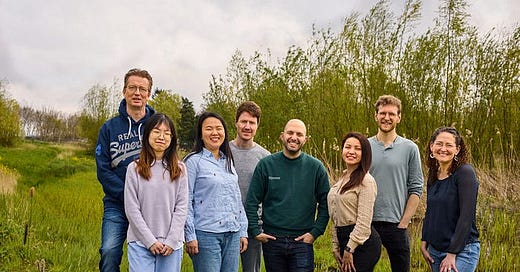Decoupling food production from agriculture: Our Investment in Farmless
Imagine a future where we can re-wild the planet, where we no longer need to rely on destructive agricultural practices to produce the protein needed to feed a growing population. At Revent, we are committed to investing in ambitious solutions to the world’s most pressing challenges, which is why we are thrilled to have invested in Farmless, a deep tech company founded by Adnan Oner, with a revolutionary approach to food production.
Our planet is facing a looming crisis caused by the devastating impact of animal agriculture on the environment. From greenhouse gas emissions, water use, and biodiversity loss to the widespread use of harmful agrochemicals and antibiotics, the way we eat is destroying our planet and threatening public health.
Our alternatives are insufficient
While still significantly more sustainable than animal-farming, plant-based protein alternatives such as soy, pea, and wheat are insufficient long term alternatives at scale due to their reliance on land, energy, water, and chemicals — particularly in regions where practices such as mono-cropping are used to improve margins, causing widespread biodiversity loss and depleting soil health.
To meet global protein demands, a new category of alternative protein products is emerging. Cultivation (growing mammalian cells to produce meat) is in its infancy and faces a myriad of technical and cost challenges. Other companies utilise a more tried and true technology: fermentation. Humans have been fermenting products for centuries (cheers! 🍻), but the careful study of microbial properties and their behaviour under various conditions is advancing, bringing fermentation into the mainstream conversation about food. These fermentation companies develop microbial protein that can be incorporated into foods (🍔🥓🌭) to enhance nutritional profile and to improve flavour and texture.
Fermentation comes with its own technical, economic, and environmental challenges, particularly as these processes scale. The two predominant methods face major challenges:
Traditional fermentation methods rely on liquid sugar as feedstock, another crop that is linked to habitat loss and air and water pollution due to widespread mono-cropping practices. Growing more sugar cane (often under poor labour conditions) to meet traditional fermentation demands is not the solution to feed the planet.
Gas fermentation methods rely on gas as a feedstock, often CO2, which is difficult to compress and store, making logistics difficult. Moreover, mass transfer rates for gas fermentation are low, and requisite high pressures require custom bioreactors, making this an expensive (and unsolved!) challenge.
To address these challenges we need a liquid-fermentation method that could be scaled reliably without agricultural feedstock.
Farmless: Introducing a fundamental shift in food
Farmless is building a revolutionary new platform for food production — one that is both scalable and completely decoupled from agriculture, an elegant solution to the issues fermentation companies have faced. Their solution will require 10–25x less land than plant protein (and up to 500x less land than meat!).
The company is based in the Netherlands, an epicenter of foodtech and energy innovation, where they have re-imagined the production of biomass to come from renewable energy, completely shortcutting photosynthesis.
Farmless’ secret is their use of renewable simple alcohols as feedstock, which enables the use of off-the-shelf liquid bioreactors, drastically lowering their CapEx and reducing risks in scale. These particular bacteria are well designed for this challenge: they have high protein content, and are some of the most energy efficient bacteria on the planet. The use of simple alcohols gives a theoretically higher yield than other feedstocks — all contributing to their ability to outperform on cost per kg.
These simple alcohols are produced sustainably (from hydrogen and CO2) and can be easily transported and stored as a liquid, unlike gas. With these advantages at scale, Farmless will produce the first carbon-negative, low cost protein for human consumption, rivaling the costs of pea and soy. The first products produced on their platform will include functional proteins and amino acids, which can be incorporated into meat and dairy substitutes.
At Revent, we believe in investing in solutions that not only have huge positive environmental impacts but also provide sustainable and accessible protein sources for areas with less food security, especially those vulnerable to the impacts of climate change. We are proud to have supported Farmless in their pre-seed round last year alongside Nucleus Capital, Possible Ventures, and notable Angels. Adnan is a physicist, serial entrepreneur, and long-time vegan who is an absolute execution powerhouse. In the last few months, we’ve watched him set up a lab, develop initial formulations, and begin to scale their tech and team.
Join us in imagining a future where we can re-wild the planet, prevent widespread biodiversity loss, and make a long-lasting impact on the environment and public health. 🚀








